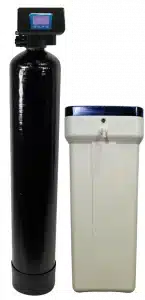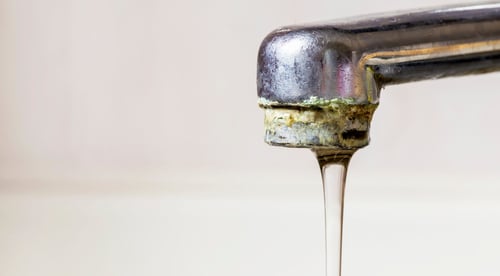Q. How do water softeners work?
A. Water softeners use a special type of inert resin that selectively removes dissolved positively charged particles, known as ions (in this case calcium and magnesium ions) from water in a process known as ion-exchange.
For every ion of calcium that the resin removes, it adds an ion of sodium, or potassium if you use potassium salt. Since sodium or potassium does not form scale or deposits the way calcium hardness does, the water is then considered “soft”.
Q.Is salt added to the water to make it soft?
A.No. Salt in of itself does not make the water soft. Removing calcium and magnesium and other “hardness minerals” from water is what makes the water soft.
Q. Is all water hard? What is considered ‘hard' water?
A. No. Waters above 6 to 8 grains of calcium carbonate per gallon are considered “hard”. If you are on a private well or spring, you should test your water. Not all city waters are hard. If you see white spots and scale on fixtures and appliances though, chances are the water is “hard”.
Q.Doesn't my body need the calcium that it is in my water?
A. No. A balanced diet of calcium-rich foods such as vegetables, meat, soy or dairy products are better sources of calcium.
Q. Isn't all that salt that a water softeners add to the water a major health problem?
A.No. The sodium level in softened water depends on the hardness of the water and the amount of water one would consume. For instance, very hard water containing 20 grains/gallon (also expressed as 340 mg/liter) would add 340 mg of sodium for every liter (about a half a gallon) of water drank. One would have to drink over four gallons of water to exceed recommended daily sodium levels, and in many cases much more than that.
Q.Is softened water OK to drink?
A. Yes and No. Many softened waters are fine for drinking, but it depends on the total dissolved solids and any additives such as chlorine, or contaminants such as nitrate or metals. Soft water removes calcium & hardness minerals only. In most of the areas we serve, the total dissolved solids are high enough that many of our clients use reverse-osmosis systems to purify the water at one tap for drinking and purified ice etc. They continue drinking the water occasionally from other areas of the house.
Q.Doesn't soft water corrode piping?
A. No, this has proven to be false. The confusion arises because many naturally soft waters are also low in pH (acidic) and are naturally corrosive. Softened water actually has a slightly higher pH than un-softened water. Calcium buildup can cause corrosion sites to develop in piping systems and soft water may actually help to prevent corrosion in some cases.
Q. Why is soft water slippery or slimy feeling in the shower?
A. After the calcium is removed the water will feel more slippery, but this does not make your skin dry. Most people will report that after showering in soft water their skin and hair feels softer and less dry.
Q. I really do not like the slippery feeling, yet my water is hard, what can I do?
A. The softeners we have can be adjusted so that a little hard water is blended back into the soft water. This makes the water softer but not zero soft so it eliminates the problem of the slippery feeling. Our systems come with by-pass mixing valve that allows one to blend in some hard water.
Q. Will I save on soap or laundry products by using soft water?
A. Yes! You can expect to dramatically reduce soap and detergent use, on some waters up to 80%. Commercial laundries and hotels know the benefits of soft water and widely use water softeners.
Q. What about alternatives to softened water such as magnets, catalytic water conditioners, and catalytic filter media? Do they soften the water without salt?
A. None of these devices physically remove calcium hardness from water.
Instead, the water is treated so it won't form scale in pipes and on fixtures or appliances such as water heaters. If you have very hard water (over 15 grains per gallon) and you want fixtures and appliances to be free of spotting, a water softener that removes the hardness is often the best choice.
For eliminating scale in pipes, fixtures and appliances, the Template Assisted Crystallization (“TAC”) conditioners are the most effective and powerful no-salt treatment systems. Read more about them here
More Water Softeners FAQ
Unlock the Secrets of Water Quality: A Collection of Expert Resources”
-
Get It Straight: Hard Truths About Soft Water
- Link: Clean Water Store Blog
- Description: Explore the science and myths of soft water with this insightful article, providing a comprehensive understanding of its characteristics, benefits, more water softeners FAQ, and the underlying science.
-
U.S. Environmental Protection Agency (EPA) – Ground Water and Drinking Water
- Link: EPA Ground Water and Drinking Water
- Description: Navigate through a wealth of information about groundwater, drinking water, and various water issues, including hard water, provided by the EPA, ensuring guidelines and standards for safe drinking water in the United States.
-
U.S. Geological Survey (USGS) – Water Hardness and Alkalinity
- Link: USGS Water Hardness Information
- Description: The USGS provides a detailed overview of water hardness, exploring its causes, impacts, and geographical distribution across various regions, offering scientific insights into water quality and hardness.
-
Centers for Disease Control and Prevention (CDC) – Private Wells
- Link: CDC Private Wells
- Description: The CDC offers a robust guide on managing private wells, including essential information on testing, treating, and maintaining well water to ensure safety and health, with a focus on private well management.
-
National Ground Water Association (NGWA) – Well Owner Resources
- Link: NGWA Well Owner Resources
- Description: NGWA provides a wide array of resources tailored for well owners, covering crucial topics like well maintenance, water testing, and addressing various water-related issues, offering expert advice and solutions for well owners.








